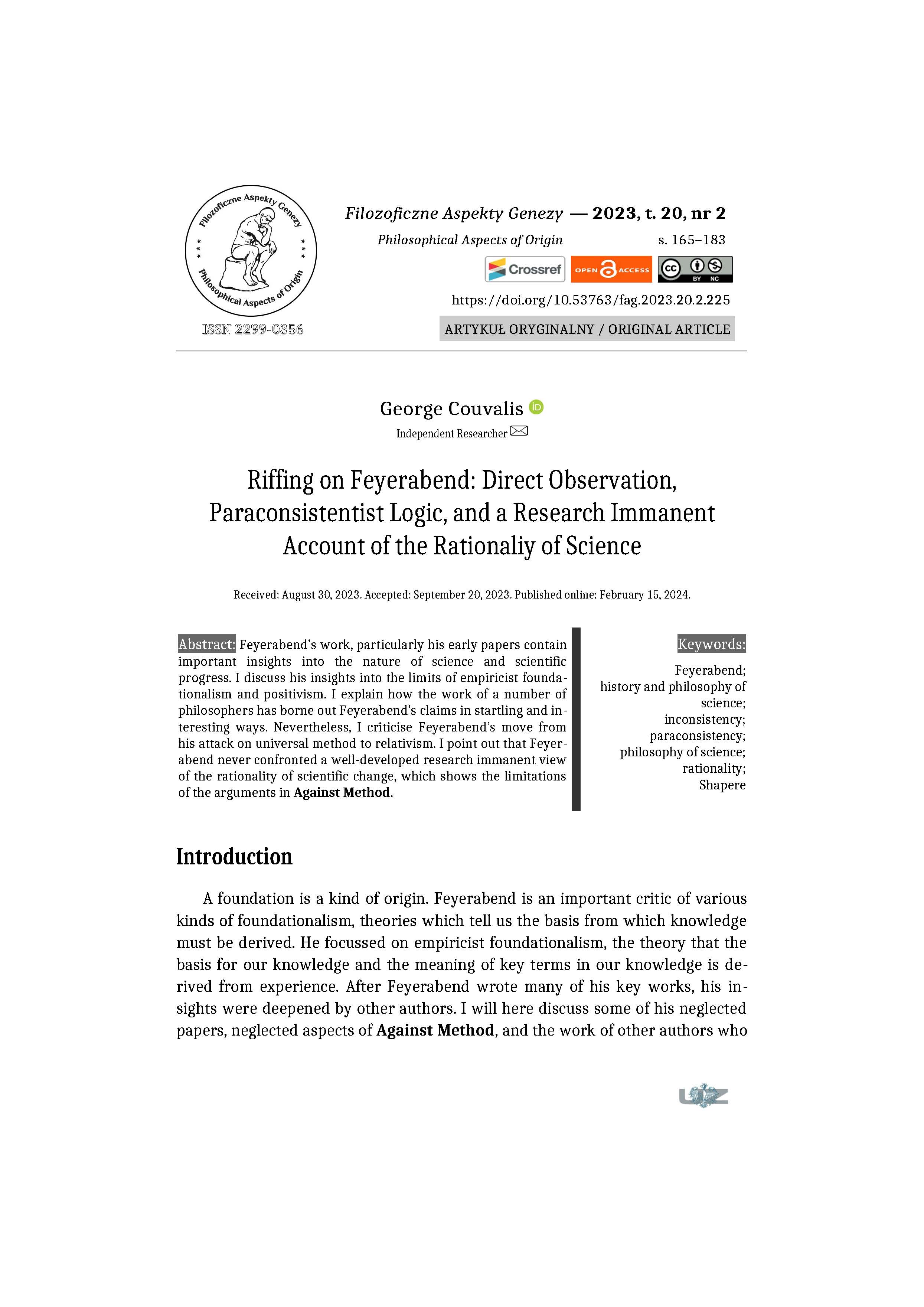Riffing on Feyerabend: Direct Observation, Paraconsistentist Logic, and a Research Immanent Account of the Rationaliy of Science

Opublikowane 15.02.2024 — zaktualizowane 28.05.2024
Wersje
- 28.05.2024 - (2)
- 15.02.2024 - (1)
Słowa kluczowe
- Feyerabend,
- history and philosophy of science,
- inconsistency,
- paraconsistency,
- philosophy of science
- scientific rationality,
- Shapere ...More
Prawa autorskie (c) 2023 Filozoficzne Aspekty Genezy

Utwór dostępny jest na licencji Creative Commons Uznanie autorstwa – Użycie niekomercyjne 4.0 Międzynarodowe.
Jak cytować
Abstrakt
Feyerabend’s work, particularly his early papers contain important insights into the nature of science and scientific progress. I discuss his insights into the limits of empiricist foundationalism and positivism. I explain how the work of a number of philosophers has borne out Feyerabend’s claims in startling and interesting ways. Nevertheless, I criticise Feyerabend’s move from his attack on universal method to relativism. I point out that Feyerabend never confronted a well-developed research immanent view of the rationality of scientific change, which shows the limitations of the arguments in Against Method.
Downloads
Bibliografia
- Anderson Alan, Belnap Nuel, and Dunn Michael (eds.), Entailment 1, Princeton University Press, Princeton 1976.
- Brown Bryson and Priest Graham, Chunk and Permeate, a Paraconsistentist Inference Strategy, Part 1: The Infinitesimal Calculus, Journal of Philosophical Logic 2004, Vol. 33, No. 4, pp. 379–388, https://doi.org/10.1023/B:LOGI.0000036831.48866.12.
- Chalmers Alan, The Scientist’s Atom and the Philosopher’s Stone: How Science Succeeded and Philosophy Failed to Gain Knowledge of Atoms, Boston Studies in the Philosophy of Science, Vol. 279, Springer, Dordrecht 2009.
- Chang Hasok, Inventing Temperature: Measurement and Scientific Progress, Oxford University Press, New York 2007.
- Couvalis George, Feyerabend, Critique of Rationality in Science, in: Byron Kaldis (ed.), Encyclopedia of Philosophy and the Social Sciences, Volume 1, Sage Publications, London 2013, pp. 356–359.
- Couvalis George and Usher Mathew, Plato on False Pains and Modern Cognitive Science, Philosophical Inquiry 2003, Vol. 25, No. 3, pp. 99–115.
- Chalmers Alan, Science and its Fabrication, Open University Press, Milton Keynes 1990.
- Couvalis George, Feyerabend’s Critique of Foundationalism, Avebury, Aldershot 1989.
- Couvalis George, The Philosophy of Science, Sage, London 1997.
- Drake Stillman, Galileo at Work, University of Chicago Press, Chicago 1978.
- Feyerabend Paul, Against Method, Third Edition, Verso Books, London 1993.
- Feyerabend Paul, On the Interpretation of Scientific Theories (1960), in: Paul Feyerabend, Philosophical Papers, Volume 1, Realism, Rationalism and Scientific Method, Cambridge, Cambridge University Press 1981, p. 37–43.
- Feyerabend Paul, The Problem of Theoretical Entities (1960), trans. from the German Daniel Sirtes and Eric Oberheim, trans. from the German by Daniel Sirtes and Eric Oberheim, in: Paul Feyerabend, Philosophical Papers, Volume 3, Knowledge, Science and Relativism, Cambridge — New York — Melbourne, Cambridge University Press 1999, pp. 16¬–49.
- Fodor Jerry, Observation Reconsidered, Philosophy of Science 1984, Vol. 51, No. 1, pp. 23–43, https://www.jstor.org/stable/187729 [15.09.2023].
- Fodor Jerry, The Dogma that Didn’t Bark, Mind 1991, Vol. 100, No. 2, p. 202 [201–220], https://www.jstor.org/stable/2254867 [15.09.2023].
- Fox Robert, The Caloric Theory of Gases, Clarendon Press, Oxford 1971.
- Grahek Nicola, Feeling Pain and Being in Pain, MIT Press, Cambridge 2011.
- Hardcastle Gray, The Myth of Pain, MIT Press, Cambridge 2001.
- Mortensen Chris, Inconsistent Geometry, Studies in Logic, Volume 27, College Publications, London 2010.
- Mortensen Chris, The Impossible Arises, Oscar Reutesvärd and his Contemporaries, Indiana University Press, Bloomington 2022.
- Roller Duane, Case 3: The Early Development of Temperature and Heat, Harvard University Press, Cambridge 1950.
- Shapere Dudley, The Concept of Observation in Science and Philosophy, Philosophy of Science 1982, Vol. 49, No. 4, p. 485–525, https://www.jstor.org/stable/187163 [15.09.2023].
- Routley Richard, Meyer Robert, Plumwood Valerie, and Brady Ross, Relevant Logics and Their Rivals 1, Ridgeview Publishing, Atrascadero 1982.
- Shapere Dudley, The Character of Scientific Change (1983), in: Dudley Shapere, Reason and the Search for Knowledge, Reidel, Dordrecht 1984, pp. 205–260.
- Shapere Dudley, The Concept of Observation in Science and Philosophy (summary version), in: Dudley Shapere (ed.), Reason and the Search for Knowledge, Dordrecht, Reidel 1984, pp. 342–351.
- Tranekjaer–Rasmussen Edgar, On Perspectoid Distances, Acta Psychologica 1955, Vol. 11, pp. 297–302.
- Quine Willard, From a Logical Point of View, Norton, New York 1961.
- https://www.nobelprize.org/prizes/physics/2002/summary/ [15.09.2023].


